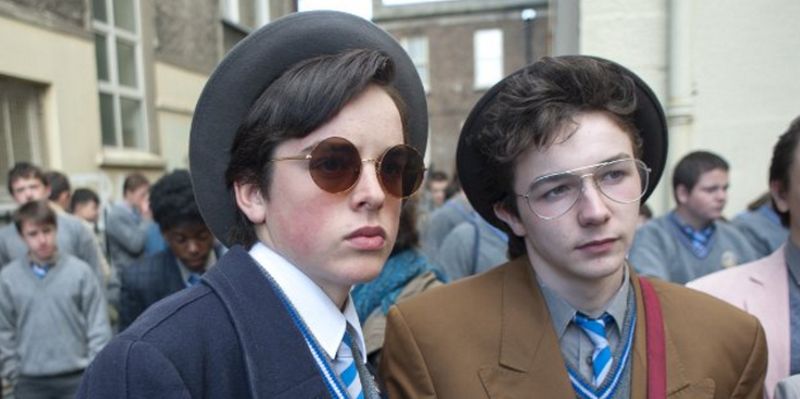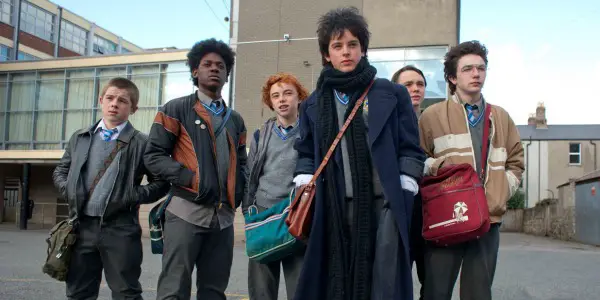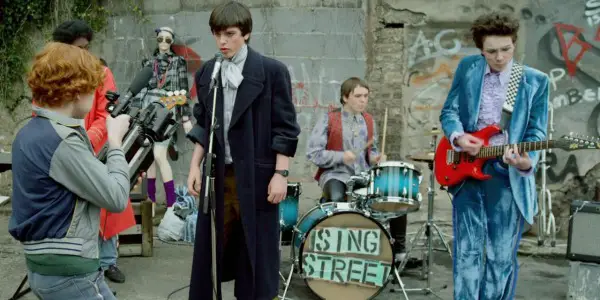SING STREET: An Inauthentic Celebration Of 80’s Pop Music

Alistair is a 25 year old writer based in Cambridge.…
Director John Carney’s most beloved films are all about the idea of “authentic” music, with protagonists who are either singer-songwriters or bands all struggling to make a living when soulless pop is all that is keeping the music industry alive.
His previous film Begin Again was about a struggling singer and a washed-up music producer making a concept album that laughed in the face of pop music’s obsession with inauthenticity. The characters were celebrated in the film, despite making an album of beige-sounding Starbucks music that seemed to ignore that rock’n’roll is so exciting because of its lack of authenticity.
You never saw Bowie out-of-character and he is one of the most celebrated pop icons in history because of it – in the musically conservative world of Begin Again, he pales in comparison to Norah Jones.
Utterly Deluded
The laughable nature of Begin Again’s central “authenticity” thesis is somewhat rectified by Carney’s latest film, Sing Street. The simple story is about Conor Lalor (newcomer Ferdia Walsh-Peelo), a middle class boy whose family’s money troubles during the Irish recession of the eighties leads him to be moved from private education to a rough, working-class Catholic school named Synge Street. One day, he and a new friend see a girl who looks like a model over the street from their school – he pretends to be in a band and asks her to star in their new music video.
She agrees and he is then left, in classic facial tradition, to form a band to fit this lie, with no clear musical direction. The band is clearly manufactured; flyers asking kids to audition are posted, whilst Conor’s older brother (a scene-stealing Jack Reynor) references the Sex Pistols’ lack of musical talent, but completely authentic personalities – a telling reference, due to the fact they were manufactured in a similar manner by Malcom McLaren.
Throughout, the film is a celebration of a rock’n’roll fantasy at its most manufactured; a winning running joke is the fact the band can never settle on an identity, appearing as new romantics one minute and Cure-style “happy-sad” goths the next. It makes for an unlikely comparison with Linklater’sreview here), another tale of young men hopping genre to genre to find their own musical identities and hopefully finding girls along the way.

Another trait that Sing Street and Richard Linklater’s film share is that their would-be “feel good” status is left feeling unearned due to the socially conservative views of the characters we are supposed to empathise with. As the film progresses, Conor Lalor increasingly suffers from “nice guy syndrome”, appearing as a sensitive soul, but merely only trying to further a relationship with the manic pixie dream girl of a female lead.
In its third act, the film threatens to overtake Me and Earl and the Dying Girl as the most offensive use of this sexist female character archetype, as our “nice guy” hero’s seething anger at her dating an older guy culminates in him storming off in a hissy fit at the revelation she’s a victim of domestic abuse. She has failed to live up to his perfect fantasy by being beaten in this manner. Even worse is that she claims she “deserved it”, with the bruises never seen again in subsequent scenes. To top this all off, she then falls for the “nice guy” who was earlier indifferent to her pain because it was in the hands of a love rival.
In Sing Street, the inauthenticity stretches to characterisation, not just the soundtrack. For all the social realism that frequently gives the film a beating heart and soul, the final stretch of the narrative undoes all previous goodwill towards it as Carney is clearly in love with these characters, despite their lack of empathy. It isn’t a rock’n’roll fantasy so much as it is utterly deluded.
The Worst Of The 80’s
In fact, this third-act retroactively makes the film’s earlier un-PC humour change from “knowingly outdated” to “derogatory” as a result. One of the band members is chosen simply because he’s black, under the assumption it would be cool to have a black guy in the band. Due to the setting in 80’s Ireland and the gag at the expense of manufactured pop, this is clearly a knowing joke referencing tokenism. But as the film gets more misjudged, it could be argued it is an abuser of tokenism itself; after all, this character never has any real narrative purpose and is there just for the sake of diversity and a few cheap laughs at his expense.

As for the casual homophobia? That at least feels authentic to the setting, but could have been handled in a much stronger way, especially considering the film introduces a gender fluidity sub-plot only to abandon it. In a socially conservative period, these themes need to be addressed; they go hand-in-hand with the LGBT-friendly themes in the music of the era.
Instead, Carney mines laughs from a few Village People jokes and casual utterances of “faggot”, accidentally reappropriating the groundbreaking pop-culture of the era as a form of conservative regressiveness. The music of the era and the film both aspire to preach anti-establishment views, so why does Sing Street feel as if it is playing into the same outdated views held by society at the time instead of upturning them?
The movie does contain some of the most magical cinematic sequences of the year. A fantasy sequence as Conor imagines an elaborate Back to the Future-inspired music video brought me close to weeping with joy, especially as it almost threatened to derail the manic pixie dream girl preconceptions as a result. The fact it then returned to that trope straight after just made weep real tears of frustration.
Carney understands the relationship between music and cinema better than many directors working today; the cinematography here intentionally mimics the handheld camerawork in the band’s DIY music videos, making each fantasy sequence all the more remarkable as a result. The original songs are all irresistible too. You can’t imagine a group of 15-year-olds actually writing them, but they were a rare fantasy I was happy to buy into.
Conclusion
The youthful pipe dream of starting a band has rarely been more lovingly evoked. There is more to like in Sing Street than there is to hate, but it is the missteps that truly stay with you. It is rare to see a film with such winning charm misstep as woefully as Carney’s film does, questioning why you bought into it in the first place.
As a music nerd, I feel I should unashamedly love it. Instead, with all the reprehensible content within, I feel ashamed for even remotely buying into this fantasy.
Which are the best fictional bands in cinema?
Sing Street is out now in the US and on May 20 in the UK. All international release dates are here.
https://www.youtube.com/watch?v=C_YqJ_aimkM
Does content like this matter to you?
Become a Member and support film journalism. Unlock access to all of Film Inquiry`s great articles. Join a community of like-minded readers who are passionate about cinema - get access to our private members Network, give back to independent filmmakers, and more.
Alistair is a 25 year old writer based in Cambridge. He has been writing about film since the start of 2014, and in addition to Film Inquiry, regularly contributes to Gay Essential and The Digital Fix, with additional bylines in Film Stories, the BFI and Vague Visages. Because of his work for Film Inquiry, he is a recognised member of GALECA, the Gay & Lesbian Entertainment Critics' Association.













